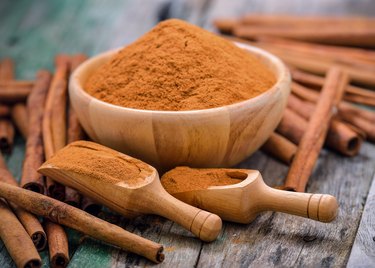
You may be surprised to learn that there are not one or two but multiple different varieties of cinnamon. Saigon cinnamon, also known as Vietnamese cinnamon, is one of them. Here's what you need to know about Vietnamese cinnamon versus other cinnamons.
Video of the Day
Video of the Day
The Types of Cinnamon
Colorado State University explains that cinnamon sticks are actually obtained from the bark of cinnamon trees. This spice has been used in foods, fragrances, religious ceremonies and medicinal preparations across many cultures around the world for centuries.
A March 2014 study published in the Journal of Agricultural and Food Chemistry notes that the genus Cinnamomum has four main species of cinnamon. The first one (Cinnamomum verum), is considered true cinnamon. This is the Sri Lankan or Ceylon variety of cinnamon; Sri Lanka continues to be the only regular supplier of true cinnamon bark and its leaf oils.
Of the other three varieties, one is Vietnamese or Saigon cinnamon (Cinnamomum loureiroi) and the other two are Chinese cinnamon (Cinnamomum cassia) and Indonesian cinnamon (Cinnamomum burmannii). The authors of the study note that while there are several other species of cinnamon as well, these are the four most economically valuable varieties of this spice.
If you've heard the term cassia used in reference to cinnamon, it's because the other three varieties of cinnamon apart from true cinnamon are classified as cassia, according to a November 2014 study published in the journal Food Additives & Contaminants.
Per Colorado State University, the cinnamon you usually see in the grocery store is most likely one of the cassia varieties of cinnamon, so it's possible that you've been using Vietnamese cinnamon sticks, powders and oils without realizing it. Cassia cinnamon varieties are often cheaper than true cinnamon.
Read more: Benefits of Cinnamon Tea
Vietnamese Cinnamon Versus Other Cinnamon
So, what's the difference between all these types of cinnamon? Do Vietnamese cinnamon sticks taste or smell any different from the other types of cinnamon? Are they better or worse in terms of nutritional and medicinal properties? Are there any benefits to buying Vietnamese cinnamon versus other cinnamons?
The authors of the March 2014 study published in the Journal of Agricultural and Food Chemistry note that among all the types of cinnamon, true cinnamon, or Sri Lankan cinnamon is considered to have the most complex and delicate flavor. In fact, the unique flavors of many English and Mexican desserts are attributed to this variety of cinnamon.
Saigon cinnamon, on the other hand, is believed to have the strongest flavor. The essential oils within the cinnamon bark give it its signature aroma and flavor. The strength of the aroma and flavor depends on how much essential oil the bark has. The authors of the study state that Vietnamese cinnamon sticks usually have a higher cinnamaldehyde content than the other varieties of cinnamon, giving them the strongest flavor.
In terms of health benefits, the study finds that all the varieties of cinnamon offer several health benefits, including lipid and blood sugar regulation, beneficial antioxidant and antimicrobial activity and treatment of respiratory tract infections, digestive disorders and diabetes.
When it comes to nutrition, Colorado State University notes that all the varieties of cinnamon are rich in dietary fiber, manganese and antioxidants. However, cassia varieties of cinnamon, including Saigon cinnamon, have higher levels of a compound known as coumarin, which can damage your liver if you consume it in large amounts.
If you're considering taking Saigon cinnamon supplements, or supplements of any other type of cinnamon for that matter, it is recommended that you consult your doctor first. The same goes for adding large amounts of any type of cinnamon to your diet.
Read more: Is Too Much Cinnamon Bad for You?
- Colorado State University: “Cinnamon”
- Journal of Agricultural and Food Chemistry: “Differentiation of the Four Major Species of Cinnamons (C. burmannii, C. verum, C. cassia and C. loureiroi) Using a Flow Injection Mass Spectrometric (FIMS) Fingerprinting Method”
- Food Additives & Contaminants: “Authentication of True Cinnamon (Cinnamon verum) Utilising Direct Analysis in Real Time (Dart)-QToF-MS”